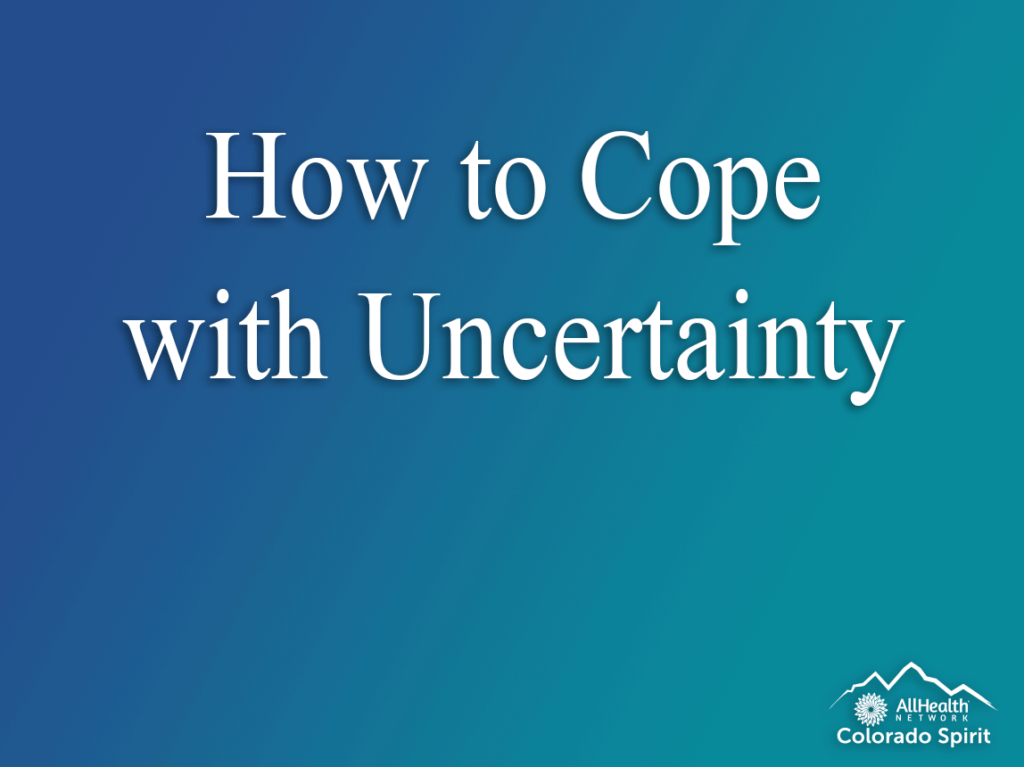We appreciate Colorado Spirit Counselor, Sara Harris, LSW, writing this week’s content!
As news breaks around the current state of the pandemic and Delta variant, the Colorado Spirit Team at AllHealth Network wanted to focus this week’s blog on how to cope with uncertainty. Last year we wrote about managing uncertainty. (Tolerating Uncertainty Blog) and (Decision Fatigue Blog) . Both of these topics seem relevant again as we navigate this new and quickly changing time. As I’ve listened to the news these past couple days my mind has been filled with uncertainty, ranging from questions around what is safe, what will things look like next week, and will this pandemic ever end?
Through various research and lived experience, we know that there are specific things you can do on an individual level to help cope with uncertainty.
Uncertainty is the only certainty there is – John Allen Paulos
First, as new breaking information about the pandemic is released 24/7 it is easy to find yourself constantly consuming headlines, stories, and statistics. While it isn’t a clinical term, many of us can fall into doom scrolling, which refers to the process of getting stuck in an endless loop of bad news. This over consumption of bad news will only fuel your uncertainty, making it imperative to limit your media exposure; and when you do get your news, make sure it’s from a trusted reputable source.
Second is to only focus on what we can control – easier said than done I know. Uncertainty is difficult to deal with because it often confronts us with the fact that we are not in control of everything around us. Focusing on what we can control – such as our choices, reactions, intentions, and relationships – can help counter this. When I am experiencing anxiety or uncertainty, I often try to remind myself of the positive things I am certain about in my life at that moment. Instead of resisting uncertainty, accepting it lets us meet life in the present moment and move forward from there. For more coping strategies around how to stop worrying about the things you can’t control, check out this Stylist blog.
Lastly, take care of yourself! Our brain often perceives uncertainty as a threat and tries to protect us by diminishing our ability to focus on anything other than creating certainty. Disrupt the cycle of angst you may be facing with physical, mental, and emotional self-care techniques – paying specific attention to proper nutrition, sleep, and exercise. When we are in stressful situations, we can often forget what helps us, so it can be very helpful to create a personal self-care kit. Grit X serves as a great tool to let you create, save, and print your own self-care tool kit. Reflect on what has been helpful in the past and what you might like to try differently this time.
No matter how overwhelming the feelings that come with stress and anxiety are, we must always remember that we are human, and though we may not be able to control their arrival, we always have the power to release them. – Cleo Wade
If speaking to someone would help, please reach out. AllHealth Network provides several supports.
- To speak with someone in the Colorado Spirit Program about stress related to the pandemic, please call 720-707-6789 or visit our webpage at allhealthnetwork.org/Colorado-Spirit
- For information about other services at AllHealth Network or to get connected with ongoing behavioral health support, please call 303-730-8858. AllHealth Network is continuing to provide service via telehealth or by phone and our Crisis Walk-in Center remains open 24/7.
If you are experiencing a mental health crisis and are in need of immediate assistance, please call the Colorado Crisis Hotline at 1-844-493-8255 (TALK) or text TALK to 38255.
Be sure to follow us on Facebook to receive information about our free groups and get notifications when we post coping tips, mindfulness suggestions, and more.
Resources:
- Mental Health Warning Signs as Kids Head Back to School
- Back to School Support for a Year Like No Other
- Providing Hope and Support for College Students


